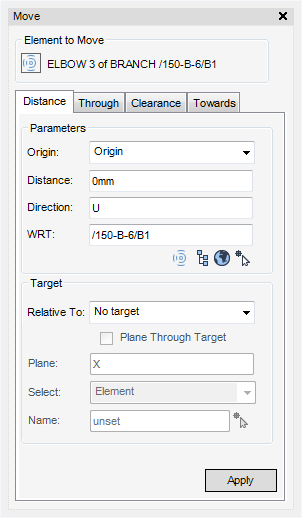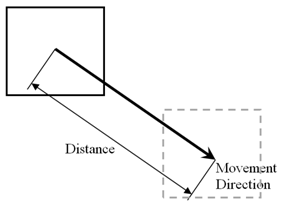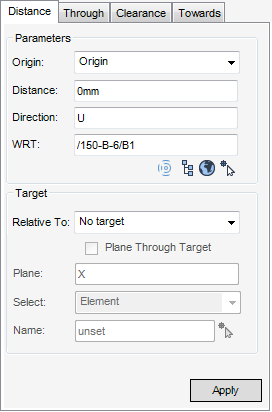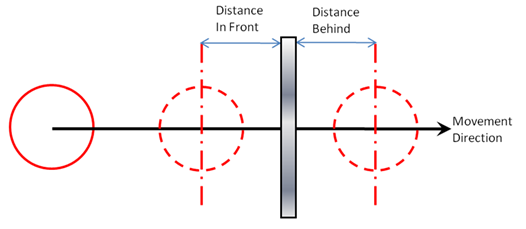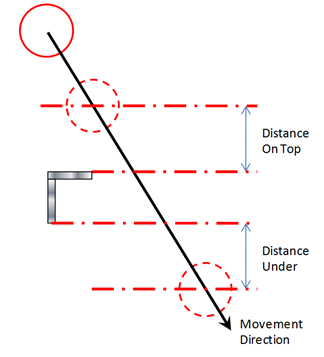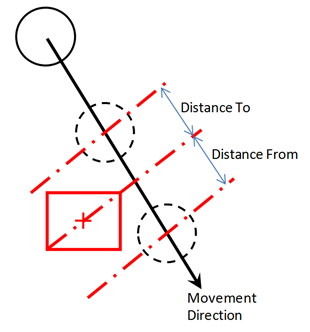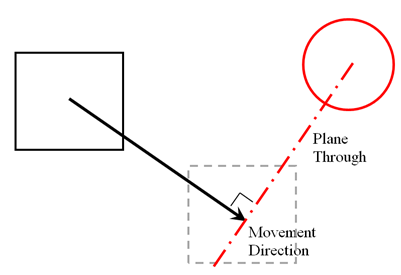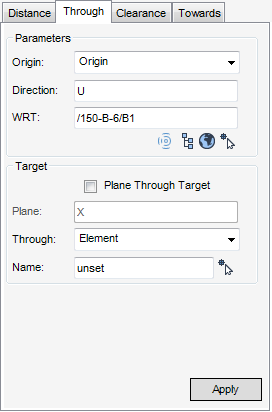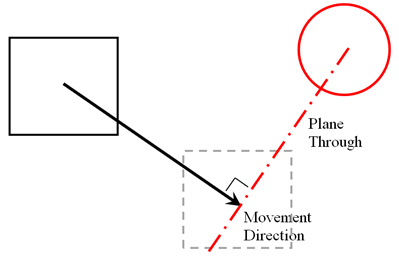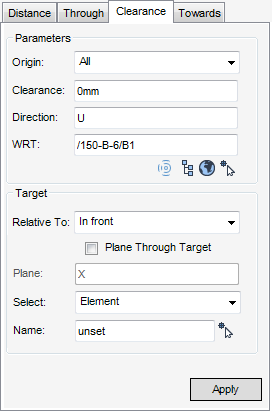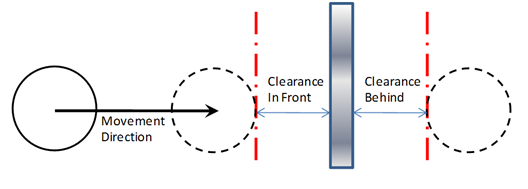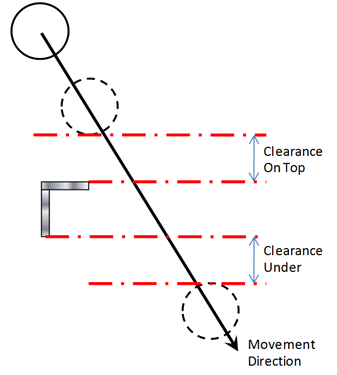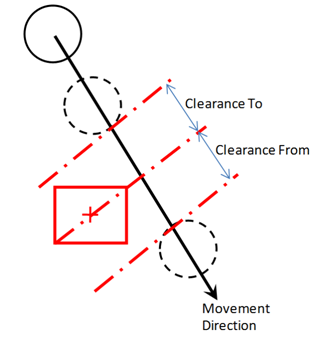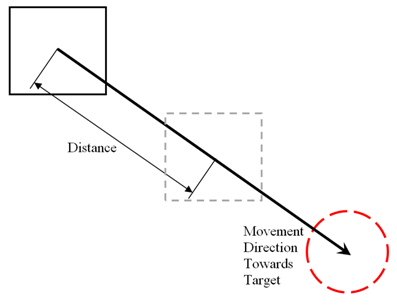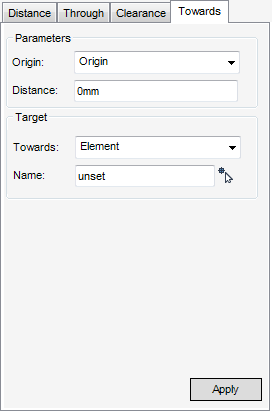Common Functionality
Design Aids : Move : Advanced Move
To move an element so that its origin moves in a specified direction and distance. Refer to Distance for further information.
To move an element so that its origin or a P-point moves in a specified direction until it lies on a plane perpendicular to the direction moved. The plane is defined relative to a reference point. Refer to Through for further information.
To move an element so that its obstruction volume or P-point is a given clearance from another element. Refer to Clearance for further information.
To move an element a specified distance in a direction relative to a reference element. Refer to Towards for further information.
Moves the Origin of an element in a specified direction and distance or moves it in relation to a reference point (P-Point) or another element.
The distance is measured in the same direction as the direction of movement unless a Reference Plane option is selected.
You must first select the element to be moved in the Model Explorer or in the 3D graphical view. On the Home tab, in the Common group, click Position Relatively By, select Move from the drop-down list to display the Move window with the Distance tab displayed.
The Parameters pane displays the following options:
From the Origin drop-down menu select Origin or the P-Point that is used as the reference point for the move.
Enter the Direction of movement and an element in the WRT field that defines the frame of reference for the direction. You can select WRT from the following options:
The Target pane displays the following options:
The Relative To option specifies how the element is positioned in relation to the target element or position:
|
The origin of the CE is moved In front of the surface of the reference element. There must be a plan component in the direction.
|
|
The origin of the CE is moved Behind the surface of the reference element. There must be a plan component in the direction.
|
|
|
The origin of the CE is moved Ontop the surface of the reference element. There must be an elevation component in the direction.
|
|
The origin of the CE is moved Under the surface of the reference element. There must be an elevation component in the direction.
|
|
|
The origin of the CE is moved until it is the specified distance From the origin of the reference element.
|
|
The origin of the CE is moved until it is the specified distance Towards the origin of the reference element.
|
Select the Plane Through Target check box to allow the current element to be moved so that its origin moves a given distance in a given direction. Where the distance is measured from the intersection of the direction of movement and the reference Plane (the Plane text field becomes active when Plane Through Target check box is selected). The reference Plane is specified relative to a reference item. The Plane must not be parallel to the direction of the movement.
The type of target item is specified by the Select drop-down list. The target can be a geometry element or a position. The following options are available:
|
Click Pick Target Element icon and pick a target element on the 3D view, to populate the Name field.
|
|
|
Click Pick Target Position icon and pick a target position on the 3D view for graphical highlight of the selected position.
|
|
You must first select the element to be moved in the Model Explorer or in the 3D graphical view. On the Home tab, in the Common group, click Position Relatively By, select Move from the drop-down list to display the Move window with the Through tab displayed.
The Parameters pane displays the following options:
From the Origin drop-down menu select Origin or the P-Point that is used as the reference point for the move.
Enter the Direction of movement and an element in the WRT field that defines the frame of reference for the direction. You can select WRT from the following options:
The Target pane displays the following options:
Select Plane Through Target check box to allow the current element to be moved so that its origin moves to the intersection of the direction of movement and the reference plane. The direction of the plane normal is entered into the Plane text field. The Plane must not be parallel to the direction of movement. The position of the plane is defined by the selected Through element or position.
The type of target item is specified by the Through option. The target can be a geometry element or a position. The following options are available:
|
Click Pick Target Element icon and pick a target element on the 3D view, to populate the Name field. Click Apply.
|
|
|
Click Pick Target Position icon and pick a target position on the 3D view for graphical highlight of the selected position. Click Apply.
|
|
You must first select the element to be moved in the Model Explorer or in the 3D graphical view. On the Home tab, in the Common group, click Position Relatively By, select Move from the drop-down list to display the Move window with the Clearance tab displayed.
The Parameters pane displays the following options:
From the Origin drop-down menu select All to use the obstruction volume or select Origin or a P-point to use as the reference point for the move.
Enter a Clearance value, the value is used together with the option selected from the Relative To options.
Enter the Direction of movement and an element in the WRT field that defines the frame of reference for the direction. You can select WRT from the following options:
The Target pane displays the following options:
The Relative To drop-down list specifies how the element is positioned in relation to the target element or position:
|
The origin of the CE is moved In front of the surface of the reference element. There must be a plan component in the direction
|
|
The origin of the CE is moved Behind the surface of the reference element. There must be a plan component in the direction.
|
|
|
The origin of the CE is moved On top the surface of the reference element. There must be an elevation component in the direction
|
|
The origin of the CE is moved Under the surface of the reference element. There must be an elevation component in the direction.
|
|
|
The origin of the CE is moved until it is the specified distance From the origin of the reference element.
|
|
The origin of the CE is moved until it is the specified distance Towards the origin of the reference element.
|
Select Plane Through Target check box to allow the current element to be moved in a given direction until it hits a reference plane offset by the given Clearance from the target item. Enter the direction of the plane normal into the Plane field text box. The plane must not be parallel to the direction of movement. The position of the plane is defined by its Clearance distance in relation to a reference point. The reference point is specified by the Relative To drop-down list. The plane passes through a point, the given distance In front of, Behind, Under or On top of the reference point.
The type of target item is specified by the Select drop-down list. The target can be a geometry element or a position. The following options are available:
|
Click Pick Target Element icon and pick a target element on the 3D view, to populate the Name field. Click Apply.
|
|
|
Click Pick Target Position icon and pick a target position on the 3D view for graphical highlight of the selected position. Click Apply.
|
|
You must first select the element to be moved in the Model Explorer or in the 3D graphical view. On the Home tab, in the Common group, click Position Relatively By, select Move from the drop-down list to display the Move window with the Towards tab displayed.
The Parameters pane displays the following options:
From the Origin drop-down menu select Origin or a P-point that is used as the reference point for the move.
Enter the Distance of the move in the text field.
The Target pane displays the following options:
The type of target item is specified by the Towards option. The target can be a geometry element or a position. The following options are available:
|
Click Pick Target Element icon and pick a target element on the 3D view, to populate the Name field. Click Apply.
|
|
|
Click Pick Target Position icon and pick a target position on the 3D view for graphical highlight of the selected position. Click Apply.
|
|
|
Note:
|
You can undo the actions of moving an element when you have clicked Apply, from the main menu bar click Undo.
|

